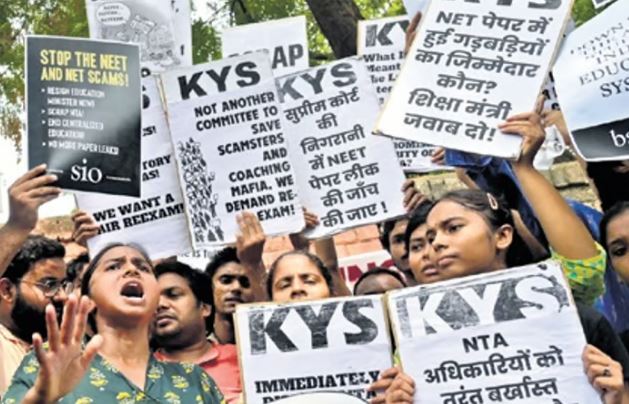Student Uprising Challenges Exam Integrity
The simmering discontent among students over alleged irregularities in competitive exams boiled over in Delhi as demonstrators, united under the banner “India against NTA,” clashed with authorities. The protests, fueled by reports of paper leaks, corruption, and a perceived lack of transparency in exams like the medical entrance exam (NEET) and UGC-NET, reached a crescendo when students attempted to march on Parliament.
Cries for Accountability Echo at Jantar Mantar
For over a week, Jantar Mantar has been transformed into a hub of student activism, with various organizations staging an indefinite sit-in. Carrying posters emblazoned with slogans demanding the ouster of the Union Education Minister and the dismantling of the National Testing Agency (NTA), the students have voiced their grievances against the perceived erosion of exam integrity.
Police Crackdown Fuels Tensions
The Delhi Police’s decision to detain over a dozen students during their march towards Parliament has further inflamed tensions. While authorities cite concerns about public order, student activists accuse the police of suppressing legitimate dissent and protecting those responsible for the alleged irregularities.
A National Crisis of Confidence
The protests have exposed a deepening crisis of confidence in the NTA, the agency responsible for conducting several high-stakes competitive exams. Student organizations, including the Left-backed All India Students Association (AISA) and Delhi University’s Krantikari Yuva Sangathan (KYS), have called for the NTA’s dissolution and the decentralization of entrance examinations. They argue that the current system is susceptible to manipulation and fails to ensure a level playing field for all aspirants.
Political Implications and Future Trajectory
The student unrest has also taken on a political dimension, with opposition parties seizing on the issue to criticize the government’s handling of the education sector. The protests have become a rallying point for those who perceive a lack of transparency and accountability in the administration of competitive exams. The students have vowed to continue their agitation, with plans for another march to Parliament in collaboration with student wings of opposition parties. The outcome of these protests could have significant implications for the future of India’s education system and the credibility of its testing agencies.
Key Learnings
| Learning Point | Description |
|---|---|
| Student Protests | Demonstrations erupt in Delhi over alleged irregularities in competitive exams like NEET and UGC-NET. |
| Demands for Accountability | Students call for the dismantling of the NTA, the resignation of the Education Minister, and exam reforms. |
| Police Crackdown | Over a dozen students detained while attempting to march on Parliament. |
| Crisis of Confidence | Protests highlight a growing distrust in the NTA and the current system of competitive exams. |
| Political Ramifications | Opposition parties leverage the issue to criticize the government’s education policies. |
Soumya Smruti Sahoo is a seasoned journalist with extensive experience in both international and Indian news writing. With a sharp analytical mind and a dedication to uncovering the truth, Soumya has built a reputation for delivering in-depth, well-researched articles that provide readers with a clear understanding of complex global and domestic issues. Her work reflects a deep commitment to journalistic integrity, making her a trusted source for accurate and insightful news coverage.



